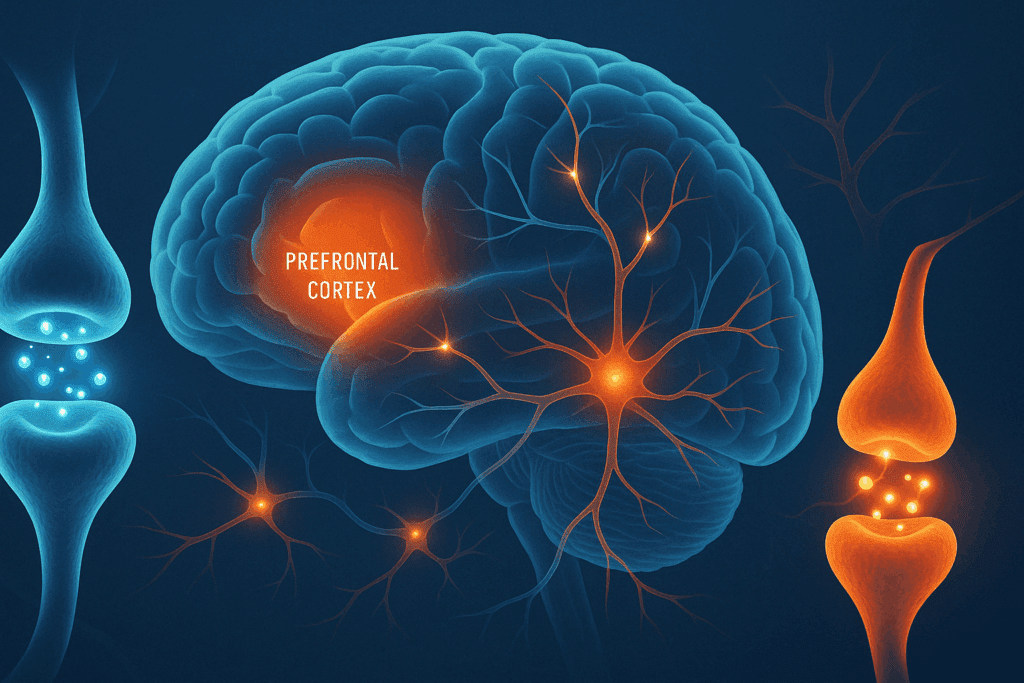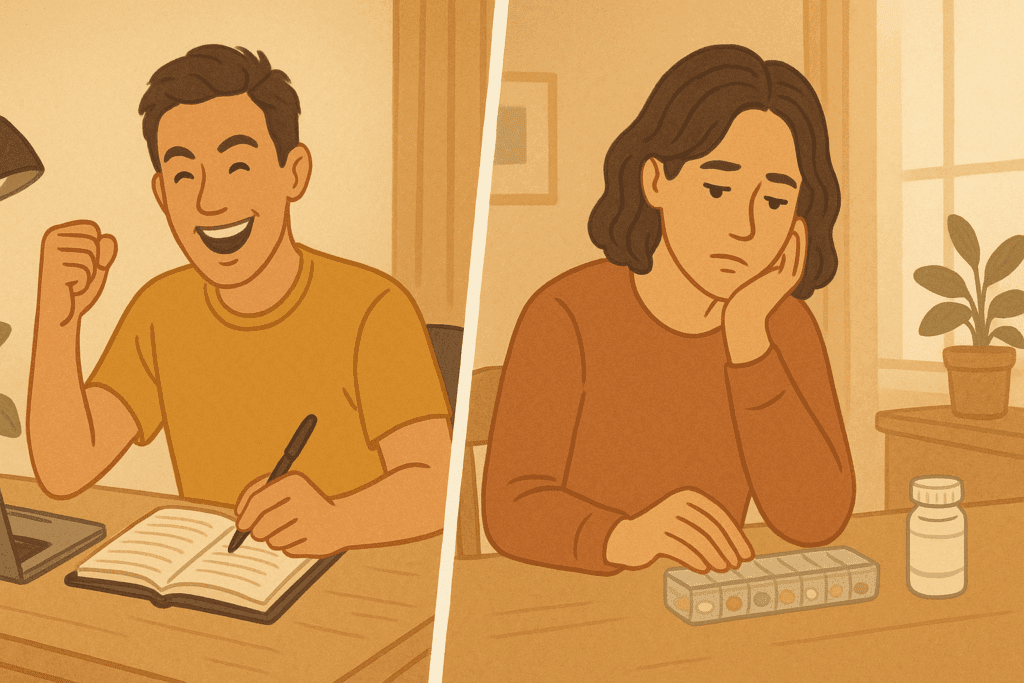Understanding Inattentive ADHD in Adults: A Subtle but Serious Challenge
For many adults living with attention-deficit/hyperactivity disorder, the most prominent symptom isn’t hyperactivity—it’s inattention. Known clinically as ADHD, predominantly inattentive presentation (sometimes referred to informally as inattentive ADD), this form of the disorder is characterized by persistent problems with concentration, memory, task completion, and decision-making. The symptoms may be less overt than those seen in hyperactive or combined-type ADHD, but their impact on everyday functioning can be just as significant. Adults with inattentive ADHD often appear disorganized, easily distracted, forgetful, or mentally “absent,” particularly in work environments requiring sustained focus and executive functioning.
You may also like: How to Choose the Best Brain Supplements for Adults: Science-Backed Ingredients That Support Focus, Memory, and Mental Clarity
Unlike children, whose inattentiveness might be noticed in the classroom, adults often go undiagnosed for years. They may be labeled as lazy, unmotivated, or even careless, when in reality they are struggling with a neurodevelopmental disorder that undermines their cognitive performance. Because the inattentive subtype does not always include disruptive or impulsive behaviors, it’s frequently overlooked, especially in women and high-functioning professionals. This delay in recognition can lead to frustration, anxiety, and even depression, all of which may compound the cognitive difficulties at the heart of inattentive ADHD.
Understanding the nature of inattentive ADHD is crucial to selecting the best treatment options. Not all medications or strategies work equally well for every individual, and adult treatment needs often differ from pediatric care. Finding the best medication for inattentive ADHD in adults requires a comprehensive understanding of how different medications work, their effectiveness in clinical trials, and how they affect real-world focus, clarity, and decision-making.

How Medications for Inattentive ADHD Work in the Brain
The core challenge in inattentive ADHD lies in the brain’s executive function network, particularly the prefrontal cortex, which governs attention, impulse control, and decision-making. Neuroimaging studies have consistently shown that individuals with ADHD exhibit altered activity in these regions, often linked to dysregulation of key neurotransmitters—namely dopamine and norepinephrine. These chemical messengers are essential for alertness, motivation, and cognitive processing. The goal of any medication for inattentive ADHD is to restore a more balanced flow of these neurotransmitters to improve mental performance and reduce symptoms.
Stimulant medications remain the most researched and effective first-line treatment. These include methylphenidate-based drugs such as Ritalin and Concerta, and amphetamine-based formulations like Adderall XR and Vyvanse. These medications work by blocking the reuptake of dopamine and norepinephrine, allowing them to remain active longer in synaptic pathways. This heightened activity supports better mental clarity, enhances focus, and enables more strategic decision-making throughout the day.
However, not everyone responds well to stimulants. Some individuals experience heightened anxiety, sleep disturbances, or appetite suppression, while others simply do not achieve the desired improvement in cognitive control. In such cases, non-stimulant medications, including atomoxetine (Strattera), guanfacine (Intuniv), and bupropion (Wellbutrin), offer alternatives with different mechanisms of action. Understanding these distinctions is essential when determining the best medication for ADHD inattentive type, especially when tailoring treatment to the individual needs of adult patients.

Evaluating the Best Medication for Inattentive ADHD in Adults: What Research Shows
Clinical trials and real-world observational studies provide a wealth of data on medication efficacy for ADHD, including the inattentive subtype. Methylphenidate and amphetamines consistently show robust results, often improving attention span, working memory, and task persistence within 30 to 60 minutes of administration. For many adults, these effects can translate into tangible benefits—being able to complete projects without procrastination, make timely decisions, and follow through on responsibilities.
Among the stimulant class, Vyvanse (lisdexamfetamine) is frequently cited as one of the best medications for inattentive ADHD in adults due to its smooth onset, long duration of action, and relatively low potential for abuse. Unlike immediate-release formulations, Vyvanse is a prodrug that must be metabolized in the body before becoming active, which provides a more gradual and consistent therapeutic effect throughout the day. Similarly, Concerta, an extended-release form of methylphenidate, is known for offering stable cognitive enhancement for up to 12 hours, making it particularly useful for adults with full work schedules.
On the non-stimulant side, atomoxetine is approved by the FDA for adult ADHD and specifically targets norepinephrine reuptake without directly affecting dopamine. While its effects may take several weeks to become noticeable, it can be especially helpful for adults with coexisting anxiety or sleep difficulties, as it lacks the arousing effects of stimulants. Bupropion, often used off-label, offers dual action on both dopamine and norepinephrine and has shown promise in adults who may also be experiencing depressive symptoms alongside ADHD.
Ultimately, the best medication for inattentive ADHD will depend on a balance of symptom severity, side effect profile, medical history, and personal preference. A collaborative approach with a knowledgeable healthcare provider is essential for finding the right fit and optimizing dosage over time.

Personalized Approaches to Finding the Right ADHD Medication
No two brains are identical, and the path to effective ADHD treatment is rarely linear. While clinical guidelines provide general recommendations, the lived experience of each individual will shape how a given medication performs. Some adults may find that their symptoms improve dramatically on a low dose of stimulant medication, while others may require several adjustments before arriving at a sustainable regimen. The presence of other conditions—such as anxiety, depression, or sleep disorders—can also influence how medications work and whether a stimulant is even appropriate.
One important consideration is whether you have to take ADHD meds every day to see consistent benefits. For many long-acting medications like Vyvanse or Concerta, daily use is recommended to maintain cognitive stability and prevent the return of symptoms. However, some individuals may choose to take medication only on weekdays or during high-demand periods. While this approach, often referred to as “drug holidays,” can reduce the risk of side effects, it may also result in fluctuating focus and performance, particularly in adults whose responsibilities extend beyond a conventional schedule.
Understanding whether you have to take ADHD medication every day depends on the medication’s duration, the individual’s symptom pattern, and lifestyle factors. For some, daily adherence is essential to support consistent performance, especially in decision-making roles where lapses in attention can lead to costly errors. For others, a more flexible routine may suffice if symptoms are milder or well-controlled through additional interventions such as therapy, exercise, or nootropic support.
Non-Stimulant Medications and Their Role in Adult Inattentive ADHD
While stimulant medications are typically more effective for the majority of patients with ADHD, non-stimulants offer a valuable alternative, especially for those who are sensitive to stimulants or at risk for misuse. These medications are often underutilized in adult populations but may be particularly well-suited for treating ADHD inattentive type medication needs in individuals who experience emotional dysregulation or sleep challenges.
Atomoxetine (Strattera) is the only non-stimulant that is FDA-approved specifically for adult ADHD. It works by increasing norepinephrine in the brain, which can help improve attention and executive function without the euphoric effects sometimes reported with stimulants. One of the strengths of atomoxetine is its minimal abuse potential and suitability for individuals with a history of substance use. However, the medication may take several weeks to become effective and can cause fatigue or gastrointestinal discomfort in the initial stages of treatment.
Another option for medicine for ADHD inattentive type includes guanfacine, which works on alpha-2 adrenergic receptors in the brain to improve working memory and emotional regulation. Though more commonly used in pediatric cases, it has shown benefits for adults with specific cognitive or behavioral patterns. Similarly, bupropion—primarily an antidepressant—offers a dual mechanism of dopamine and norepinephrine enhancement, making it a promising option for adults with comorbid depression and inattentive symptoms.
These non-stimulant approaches are particularly relevant in cases where stimulant medication alone is insufficient or poorly tolerated. They may also be used in combination with cognitive-behavioral strategies, coaching, and nootropic support to build a more comprehensive treatment plan that supports long-term focus and decision-making.

Functional Outcomes: How ADHD Medications Support Decision-Making and Focus
At their best, meds for inattentive ADHD do more than simply help people pay attention. They support higher-order cognitive skills—planning, prioritization, judgment, and mental flexibility—that are essential for adult life. This is especially relevant in professional settings where decision-making is constant and errors can have real consequences. Adults with untreated ADHD often struggle to weigh competing priorities, assess risk, and follow through on long-term goals. These challenges can be demoralizing and may create patterns of self-doubt or underperformance.
With appropriate treatment, however, many adults experience a renewed sense of mental clarity. They find it easier to filter out distractions, stay on track with goals, and make timely decisions without second-guessing themselves. These improvements are not solely a matter of chemistry—they reflect a restored capacity to self-regulate and engage more fully with one’s responsibilities. The right ADHD inattentive type medication can help unlock this potential by aligning the brain’s chemistry with the demands of real life.
It’s also worth noting that medication is often most effective when paired with lifestyle interventions that support cognitive health. Regular physical exercise, structured routines, mindfulness practices, and dietary strategies can all amplify the benefits of pharmacological treatment. In this sense, finding the best medication for ADHD inattentive type is not just about symptom suppression—it’s about enhancing overall cognitive vitality and functional capacity.
Real-World Considerations: Tolerability, Adherence, and Long-Term Management
For any adult navigating ADHD treatment, tolerability and long-term adherence are just as important as initial effectiveness. Even the most powerful meds for ADHD inattentive type are useless if they create intolerable side effects or feel unsustainable in day-to-day life. Common side effects of stimulant medications include appetite suppression, insomnia, irritability, and elevated heart rate. These effects can often be managed through dosage adjustments, timing strategies, or switching to a different formulation. However, for some, they may signal the need to explore non-stimulant options.
Another factor is the logistical reality of daily dosing. Adults juggling work, family, and personal responsibilities may forget to take their medication consistently, which can lead to uneven results. In such cases, long-acting formulations or patch-based systems may provide a more convenient and effective alternative. These options reduce the burden of midday dosing and ensure more stable blood levels throughout the day.
A question that frequently arises is whether you have to take ADHD meds every day for them to work. The answer varies by individual and medication type. Long-acting stimulants are generally most effective with daily use, while short-acting ones may offer more flexibility. However, skipping doses can cause fluctuations in focus and productivity, particularly for adults in high-stakes or intellectually demanding roles. Collaborative planning with a healthcare provider can help establish a sustainable regimen that meets both clinical and lifestyle needs.
Exploring Complementary Strategies for Cognitive Enhancement
While medication plays a central role in managing inattentive ADHD, many adults seek additional strategies to enhance their focus, mental clarity, and decision-making capacity. Nootropics, or cognitive enhancers, have gained popularity for their potential to support brain health and supplement pharmacological treatment. Substances such as L-theanine, omega-3 fatty acids, Rhodiola rosea, and citicoline have shown promise in improving attention, mental stamina, and stress resilience in adults with or without ADHD.
Cognitive behavioral therapy (CBT) is another evidence-based approach that complements inattentive ADD medication. CBT helps individuals identify and restructure cognitive distortions, develop time-management skills, and implement routines that reinforce executive function. When used alongside medication, CBT can enhance treatment outcomes and provide individuals with tools for long-term self-regulation.
Ultimately, a multimodal approach—combining pharmacology, behavioral strategies, nutritional support, and lifestyle optimization—offers the most comprehensive path forward. Medications lay the neurological foundation for clearer thinking, while complementary methods support the habits and behaviors that make focus sustainable.

FAQ: Inattentive ADHD Medication in Adults – Advanced Insights for Treatment and Daily Use
1. How do lifestyle habits influence the effectiveness of medication for inattentive ADHD?
While medication for inattentive ADHD is often a cornerstone of treatment, lifestyle choices significantly affect its long-term success. Adults who prioritize sleep hygiene, regular exercise, and balanced nutrition may experience more consistent benefits from their meds for inattentive ADHD. For example, intense sugar consumption and chronic stress can impair neurotransmitter balance, making even the best medication for inattentive ADHD in adults less effective. Similarly, circadian rhythm disruptions can interfere with how the brain responds to stimulant or non-stimulant medications. In practice, pairing medication with healthy routines often results in better focus, emotional regulation, and long-term symptom management.
2. Can you switch from one ADHD inattentive type medication to another without a break?
In many cases, transitions between ADHD inattentive type medication options—such as moving from methylphenidate to atomoxetine—require careful planning, but not necessarily a full medication break. Physicians typically use a cross-tapering strategy, especially when switching from a stimulant to a non-stimulant or vice versa. However, individual factors like heart health, sleep issues, or comorbid anxiety can determine how abrupt or gradual the switch should be. This is especially relevant when exploring the best medication for ADHD inattentive type, as some adults respond poorly to sudden pharmacological changes. Working closely with a provider ensures the transition minimizes cognitive disruption while maximizing treatment continuity.
3. What are some non-obvious signs that your current inattentive ADD medication may not be the right fit?
Beyond common side effects like appetite loss or insomnia, subtler signs may indicate your current inattentive ADD medication isn’t optimal. These include mental fog late in the day, increased irritability in the early afternoon (known as “rebound”), or feeling unusually unmotivated even when tasks are clear. If your focus improves slightly but task initiation or follow-through remains poor, your meds for ADHD inattentive type may need adjustment. The best medication for inattentive ADHD should enhance both attention and executive functioning, not just reduce distractibility. Journaling your symptoms can help your provider track these nuanced patterns over time.
4. Are there risks of taking the best medication for inattentive ADHD in adults long-term?
Long-term use of any medicine for ADHD inattentive type—especially stimulants—requires monitoring, but many adults take these safely for years. Common concerns include increased blood pressure, sleep disturbances, or emotional blunting, though these often stabilize with dosage adjustments. Non-stimulants, while slower-acting, may pose fewer risks over time, especially for individuals with cardiac concerns or a history of substance use. Importantly, research shows that untreated inattentive ADHD can lead to more severe outcomes—like job loss or chronic burnout—than any potential side effects of long-term treatment. Finding the best medication for inattentive ADHD in adults often means balancing effectiveness with sustainable health practices.
5. Do you have to take ADHD meds every day, or are breaks possible?
The question of “do you have to take ADHD meds every day?” depends on the type of medication and the nature of your symptoms. For stimulant-based meds for inattentive ADHD, some adults use “drug holidays” on weekends or vacations to minimize tolerance and side effects. However, this approach isn’t recommended for everyone, especially those with executive dysfunction that impacts daily routines. Non-stimulant medications typically require consistent daily use for cumulative effects, so skipping doses may reduce their efficacy. Ultimately, whether you do or don’t have to take ADHD medication every day should be a shared decision with your provider based on symptom patterns and lifestyle.
6. How does hormone fluctuation affect the best medication for ADHD inattentive type in women?
For women, hormone fluctuations throughout the menstrual cycle can dramatically impact how well ADHD inattentive type medication works. Estrogen levels, which enhance dopamine sensitivity, may influence how stimulants or non-stimulants are metabolized. During the luteal phase, when estrogen drops, many women report increased brain fog and emotional volatility—even with their usual medication dose. Some physicians adjust timing or dosage slightly during certain phases of the cycle to maintain focus and mood stability. These nuances make it essential to personalize the best medication for inattentive ADHD in adults rather than rely on one-size-fits-all protocols.
7. Can mindfulness or cognitive behavioral therapy (CBT) enhance the effects of meds for ADHD inattentive type?
Absolutely. While ADHD inattentive type medication improves attention at a neurochemical level, CBT and mindfulness work by reshaping habits, thought patterns, and self-regulation strategies. Adults who pair CBT with the best medication for inattentive ADHD often gain more lasting improvements, particularly in procrastination, emotional dysregulation, and low self-esteem. Mindfulness can also help reduce the impulsive task-switching and internal restlessness that medication alone doesn’t always fix. These approaches foster metacognition—awareness of how you think—which is often underdeveloped in those with inattentive ADHD. When combined, behavioral strategies and medication support holistic cognitive growth.
8. How do genetic testing and pharmacogenomics influence ADHD treatment?
Emerging technologies in pharmacogenomics can predict how your body metabolizes different ADHD inattentive type medications. Some individuals have variations in liver enzymes—especially CYP2D6—that affect how quickly they process stimulants or non-stimulants. In theory, this can help pinpoint the best medication for ADHD inattentive type with fewer trial-and-error cycles. While not standard practice yet, some clinics use genetic testing to inform decisions, especially in patients who’ve failed multiple medications. However, these tests should be interpreted cautiously and used alongside clinical insight, not as a sole diagnostic tool.
9. What social or career challenges might arise from untreated inattentive ADHD in adults, even with high intelligence?
Untreated inattentive ADHD often flies under the radar in high-functioning adults, but its impact can be profound. People may appear “capable but inconsistent,” excelling in bursts but struggling with sustained output, missed deadlines, or disorganized work habits. Even with high IQ, executive dysfunction can lead to stalled careers, burnout, and strained professional relationships. The best medication for inattentive ADHD in adults can unlock potential by stabilizing attention, but social coaching and workplace accommodations may still be necessary. Acknowledging these challenges without self-blame is essential for long-term success and emotional resilience.
10. Is there a future where ADHD inattentive treatment becomes more individualized and precise?
Yes, the field is rapidly evolving toward precision medicine. Advances in neuroimaging, genetic profiling, and machine learning models could soon help tailor ADHD inattentive type medication based on individual brain connectivity and biochemistry. Additionally, digital phenotyping—using smartphones to track behavior and symptom fluctuations—may guide real-time medication adjustments. In the future, finding the best medication for inattentive ADHD could involve algorithms that assess sleep, mood, diet, and focus patterns to optimize treatment dynamically. This evolution will move us away from trial-and-error prescribing and toward a model that truly reflects the unique needs of each brain.

Conclusion: Choosing the Best Medication for Inattentive ADHD in Adults—A Personalized Path to Focus and Mental Clarity
Choosing the best medication for inattentive ADHD in adults is not a one-size-fits-all decision. It’s a personalized process grounded in scientific evidence, clinical insight, and self-awareness. For many, stimulant medications such as Vyvanse or Concerta provide the most immediate and profound improvements in attention and executive function. Others may thrive on non-stimulants like atomoxetine or bupropion, especially when anxiety, sleep disturbances, or substance use concerns are present.
The key lies in recognizing that medication is not just about symptom relief—it’s about restoring the cognitive bandwidth needed for clear thinking, effective planning, and confident decision-making. Whether you’re exploring meds for inattentive ADHD, seeking the right inattentive ADD medication, or wondering if you have to take ADHD medication every day, the journey requires collaboration, experimentation, and patience.
Above all, adults with inattentive ADHD deserve tailored, evidence-based care that respects their unique cognitive profile and life goals. With the right treatment strategy, improved focus and mental clarity aren’t just possible—they’re entirely within reach.
Was this article helpful? Don’t let it stop with you. Share it right now with someone who needs to see it—whether it’s a friend, a colleague, or your whole network. And if staying ahead on this topic matters to you, subscribe to this publication for the most up-to-date information. You’ll get the latest insights delivered straight to you—no searching, no missing out.
Further Reading:
What is the most effective ADHD medication for adults?
Evidence-based pharmacological treatment options for ADHD in children and adolescents


